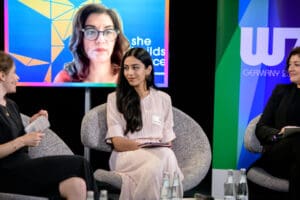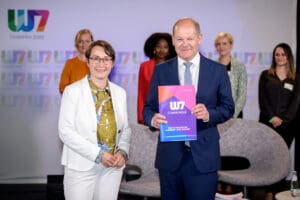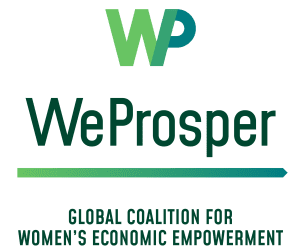
Time to Deliver on Women’s Economic Empowerment: From W7 Recommendations to G7 Action
Media Contact
Each year, the world’s seven largest economies, also known as the group of seven (G7), meet to coordinate solutions to major global issues. Prior to the G7 Summit, the G7 Presidency hosts an annual policy dialogue forum called the Women7 (W7) Summit.

The W7 Summit offers an opportunity for civil society organizations from around the world to come together alongside decisionmakers to share actionable recommendations and hold substantive dialogues. The result is the formal handing over of specific recommendations related to gender equality to the G7 leaders.
The W7 Summit took place May 24-25, 2022, in Berlin, Germany. As a Senior Global Policy Advocate at the International Center for Research on Women (ICRW) and WeProsper’s global coalition coordinator, I had the opportunity to attend the summit virtually. WeProsper, a global coalition for women’s economic empowerment (WEE), was established in 2022 to create collective global action for women’s economic empowerment, justice, and rights and to promote sustainable policy change. Other coalition members and I tuned in to the Summit and were pleased to see a variety of issues related to WEE central to the Summit discussions and recommendations.
During the two-day Summit, some of the perspectives on women’s economic empowerment that were shared by leaders across civil society and G7 leadership included:
- what a gender-transformative economic recovery to COVID-19 actually looks like and what is needed to achieve that complex goal, including comprehensive incorporation of the care economy;
- how to engage low- and middle-income countries in gender-responsive policies for climate change; and
- the need to implement a feminist foreign policy to chart a new way forward and ensure that countries are “walking the talk” when it comes to gender equality.
ICRW’s Senior Global Policy Advocate Spogmay Ahmed, serves as a W7 Advisor and spoke on a panel at the Summit. She highlighted the importance of accountability and pushing governments for time-bound and measurable commitments so that we understand progress and fill gaps that appear.

“In feminist foreign policy, we want to see time-bound and measurable commitments making sure that it’s possible to monitor and evaluate what states are committing to and making sure we have a means of understanding progress, making sure it’s being successful, and finding ways to fill gaps in progress and continue to chart our way forward.”
A major highlight was the concrete recommendations of key WEE issues put forward at the Summit via the W7 Implementation Plan. The plan includes implementing feminist macroeconomic recovery plans that promote decent work for all women (including migrant and informal workers); recognizing the value of unpaid care work by including it in indicators like gross domestic product (GDP); and formulating an updated policy framework with incentives for countries to develop and promote women’s entrepreneurship and empowerment, like increasing current spending and providing additional funding to address barriers like discriminatory social norms and unpaid care work.
Many of the issues highlighted at the summit, such as paid and unpaid care, are central to WeProsper’s advocacy agenda. WeProsper’s coalition members are gearing up to ensure that:
- governments actually implement policies to recognize unpaid and underpaid care work and enact significant investments domestically;
- governments implement economic policies that go beyond reactionary response and work towards a gender-transformative, sustainable, and inclusive recovery from the COVID-19 pandemic; and
- structural barriers that have impeded progress towards gender equality for decades are truly and fully addressed through policy, at both the national and multilateral levels.

The W7 Summit concluded with the handing over of the W7 recommendations to German Chancellor Olaf Scholtz, the current G7 President. In his remarks, Chancellor Scholtz reinforced many of the issues raised in the W7 communique, and he announced a promising new G7 monitoring mechanism to evaluate progress towards gender equality. Around gender equality – and care work in particular – he acknowledged that much still needs to be done and indicated a desire to take targeted actions, such as recognizing unpaid care work in national statistics and improving working conditions for care workers, noting that solving childcare issues are beneficial for both men and women.
The 2022 season for high-level political engagement is only just beginning, with the G7 Summit, the UN High-level Political Forum on Sustainable Development, the United Nations General Assembly, and the G20 Summit still to come. We will be watching to see how the G7 members receive, respond, and implement the recommendations of the W7. In the words of the W7 advisors, #TimetoDeliver, G7 leaders!


